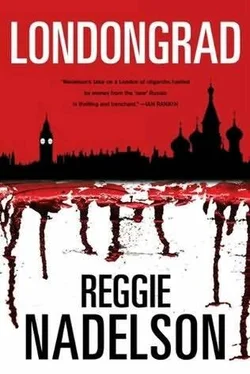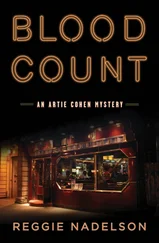“Don’t get lost in Brooklyn,” Tolya called out, grinned and waved me away.
If I had gone straight to Brooklyn from Tolya’s, if I had not stopped at home to grab some swim shorts and call Valentina, maybe I could have avoided the whole damn thing, maybe I would have avoided the little kid, yelling and waving, mouth open in an O with a howl coming out.
By the time I saw her, as she darted into the street, I was a second away from running her down, from killing her. Sweat covered my face, ran down the back of my neck. The bag on the seat next to me fell on the floor, books tumbled out, the books I was taking to the old lady for Tolya.
I slammed on the brakes. I got out of my car in the middle of the street. There wasn’t much traffic out here in this dismal corner of the city, but a few cars were honking now, and I yelled at them and grabbed her up, the kid who was yelling, and sat her down on the curb. It was a warm dry day, gusts of wind coming off the water half a mile away. Balls of newspaper and dust rolled along the nearly empty street. It was a holiday. July 4.
On the broken sidewalk out here at the edge of Brooklyn, where it butts up against Queens, I put my arm around the kid in the dirty pink t-shirt and tried to get her to talk to me.
After a while, she calmed down some, and started talking in a tiny voice and I realized she was a Russian kid. I asked her name. Dina, she mumbled, and pulled at me, and I followed her across the street, which was lined with ramshackle houses, some of the windows broken and covered with plywood and plastic. In one of the yards weeds had grown up over the skeleton of an old Mercedes. There was garbage everywhere. A desolate place, fifteen miles from the middle of Manhattan.
Dina ducked under some rough bushes. In front of us was a gate to an old playground surrounded by chain-link fencing. There was a padlock on the gate. A piece of the fence was missing and Dina got on her belly and crawled under it. I followed her into a wasteland of overgrown weeds and grass, used needles, empty bottles. It was silent, a thick, dead silence, except for something creaking, a low raw sound I couldn’t identify.
The jungle gym was broken. The sandbox was empty, no sand to play in. Dina was silent now, too, she had stopped babbling, stopped talking. Then she lifted one skinny arm and pointed and I followed her gaze and saw it, a figure on a swing. It was the source of the noise, the raw creak, the metal chains grinding against the poles where the swing hung.
Wrapped in silver duct tape that glinted dully in the morning light, the figure – probably a woman – was sitting on the swing, arms tied to the chains with rope, a harsh wind moving her back and forth. Or maybe it was her own weight that propelled her as she went to and fro, back and forth, on the swing in the deserted playground in Brooklyn.
“When did you find this?” I said in Russian as softly as I could, though there was nobody else here.
“Is she dead? She is dead?” said Dina, and then suddenly broke away from me, and ran out of the playground, head down, too fast for me to catch her, a blur of skinny legs and arms and pink shirt.
I called it in, and went back to the swings.
I caught the body and held her still. She was heavy. She seemed to lean against me. I stumbled and tripped and fell on my knees. A broken bottle cut me and blood stained my ankle.
The feel of the greasy duct tape dank from humidity made me want to gag. I could feel this was flesh under the tape, that this had been a woman.
I’ve been a cop a long time, twenty years, more, but this was so surreal, for a second I thought I was hallucinating. I didn’t know what to do, not when the body against me seemed to breathe in and out of its own accord.
Was she still alive?
From above came the sound of a solitary plane; piercing the blue sky over the city, it came in low over the Jamaica Wetlands on its way into JFK.
I had to know what was under the tape.
Holding the body still with one arm, I lifted a small section of tape off the face. The tape rasped against the skin. It had been crudely done. The tape came away easily. I touched the skin near the nose lightly, and I saw one of her eyes and thought I felt it flutter, as if it might suddenly open.
She was dead. I never was an expert on physical death but she had been on the swing a long time, far as I could tell.
Wrapped up first? Dead first?
I wanted to beat it, get out, go back on vacation, but I had to wait for help. I didn’t want some other kid like Dina stumbling in here and seeing this.
Listening for sirens. Wishing I had a cigarette. Sweating in the hot sun, all I could do now was wait.
I didn’t know what else to do so I sat on the swing next to her. Together, the dead woman and me, we swung back and forth, to and fro, like kids early in the morning with nobody else to see them.
Behind me was the sound of sirens, of voices, of footsteps. I got up off the swing, turned and saw them coming, a small army trooping onto the playground.
Somebody had removed the gate so the ambulance people could get through. Uniforms, detectives, forensics people, all of them streamed in. It was like a tribal ceremony, the woman wrapped in silver tape on the ground now, everyone else moving around her in a ritual dance.
I spotted Bobo Leven, a young detective who was Russianborn. I went over and told him what I knew and then I started out of the playground. Bobo tried to follow me. I told him it wasn’t my case. I happened to be around, but I was leaving. He wanted my help, but I said I was sorry, I had to go, I was on vacation.
“Good luck with the case,” I said finally, shaking loose of Bobo Leven, hurrying away now as a couple of photographers from forensics brushed past me to take more pictures of the corpse like the paparazzi of the dead.
On the wall of Olga Dimitriovna’s place were three photographs, black and white pictures of children staring straight at the camera, and she saw me look at them as soon as I entered the apartment.
“Yes, you imagine these were taken by Valentina Sverdloff, isn’t that right?”
I nodded.
“Please, come in, Artemy Maximovich,” she said, a wiry woman about eighty, sharp as a bird, with a humorous face who was crazy about reading, especially novels. I placed the bag Tolya had given me on a table, and she took one out and admired it.
“So, tea? Coffee? A sandwich also? You are hungry, Artemy Maximovich?” She went into the tiny kitchen to prepare food.
I put my head through the kitchen door and said I’d have a sandwich with my coffee. I wasn’t hungry, but I knew she was a solitary old lady who wanted me to stay a while and talk. I didn’t remember the photographs.
“Valentina gave them to me, a month ago, I think.”
“You know Val?”
“Of course. For a time she comes to me for her Russian lessons. But not lately. The photographs are of children at her orphanage in Moscow.”
“What orphanage?”
“Where she gives money,” said Olga. “I think perhaps not an orphanage but a shelter for girls. Please say hello. Please, sit down,” she added.
The apartment was small, the furniture old. Olga still gave Russian lessons, she had told me, but the money wasn’t much. From a radio came a Beethoven sonata.
Out of the window here on the sixteenth floor, I could almost see the playground where I’d just been. In the other direction were the nineteen brick buildings of the Boulevard Public Housing project. I could see the vast Linden Houses, too, tens of thousands of people stacked up in scores of towers and below them the tangle of urban outlands and inner suburbia, bagel stores and storefront churches, squat low synagogues, C-Town supermarkets, Chinese restaurants with bulletproof windows, makeshift mosques, Indian takeouts. And the water, the Jamaica Wetlands, the network of wild islands where water-birds congregate and the dirty strip of beach where gulls pick over garbage for their breakfast.
Читать дальше






